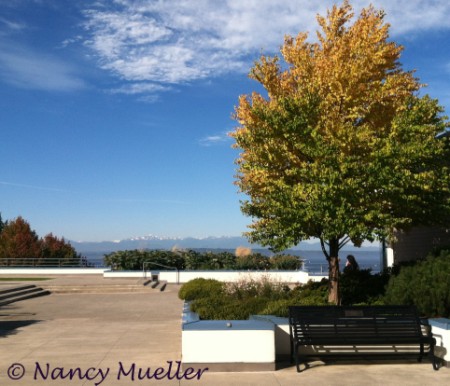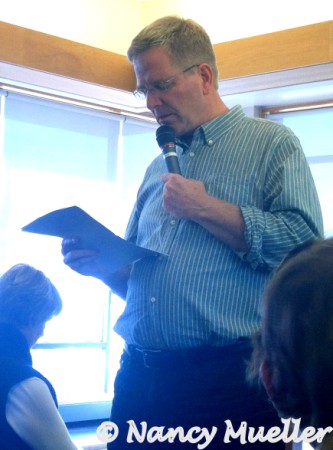
Last year’s response to Sharpening the Travel Writer’s Saw proved so popular with readers that I’m happy to share nuggets learned from the 2013 Writers on the Sound Conference (WOTS) as well.
Once again, I received just the right dose of inspiration and practical information to polish my writing in the days ahead. Here are a few highlights captured from this year’s event:

He’s baaack . . . On Travel Writing from travel guru Rick Steves . . .
“You need to have a practical foundation and weave your poetry into that if you want to make money. . . Pico Iyer is my friend and he’s brilliant. But my book on Ireland probably sells more than his most brilliant piece of writing. That’s not fair, but I’m not complaining.” Action step: Keep on writing with an eye on the business of travel writing.
“Talk with people. Find out their fears and confusions. Deal with the challenges your readers have. I look at travel writers as the current equivalent of the court jester. We need to inspire our citizenry not to be so fearful of the world. Give your readers context so they see beauty instead of conflict.” Action step: Pay attention to the fears and confusions of my readers. Remember to provide the bigger context for my travel stories. Write with my readers in mind.
“Clarity is really important. You have to put yourself in your confused readers’ minds. The struggle is to find ways to make complicated ideas clear. The temptation as travel writers is to dance around them. We have a responsibility with language. Be willing to kill your babies if they don’t fit. You lose credibility when you write: ‘This chocolate is to die for!’” Action step: Kill the clichés! But keep the chocolate.
“I think immediacy is really important. You have to be over there, collecting notes. You need to be actually doing things all the time. If you’re in Spain, go to a bullfight. If you have an opportunity, you have to take it.” Easy action step: Keep my bags packed at all times. Just say “Yes!”
Food and Wine Writing Tips from author Nick O’Connell . . .

“Focus on the story. You have to figure out a way to tell the story behind a particular dish or bottle of wine. The further you go back, the more interesting it becomes.” Action step: Start with a wide-angle lens on my travel writing. Then zoom in for a close-up look.
“Food and wine writing is happy writing. People want to be entertained. If you don’t like the dish or wine, don’t write about it.” Action step: Don’t worry. Be happy when I write. The wine helps.
“Start with the familiar and go to the unfamiliar. Readers want to feel comfortable so start with something they already know, e.g. gelato or pasta. But by the end you want to teach them something they didn’t know.” Action step: Research, research, research. Add depth to my stories.
“Bring the elements of fiction into your writing. Think scenes, characterizations, dialogue and point of view. Bring your personality to your writing. Read Bistro Cooking by Patrica Wells (scenes), Cooked by Michael Pollan and Kitchen Confidential by Anthony Bourdain (dialogue) and Ruth Reichl (how to negotiate difficult social landscapes like family gatherings at Thanksgiving). Action step: Start reading.

What are your favorite travel writing tips, Wanderboomers? Please share your ideas with us here.
Nancy if you haven’t already, post on IFWTWA Linkedin group & I’ll make it a Managers Choice.
Thanks, Marc! I appreciate it. I knew you’d like this post!
Thanks for sharing this. Very helpful and wish I could have attended! I’ve learned that I get the most responses to my travel stories when I make them personal.
Terrific post.
Wonderful tips, everyone! I tend sometimes to focus on one element when I’m writing a travel piece instead of the whole.
Thanks for sharing.
My pleasure, Nicole. There’s always next year for the conference :-)!
I think we need to do both, Bobbi. We need to focus the story angle so as not to make it too broad, but then put that focus into a larger cultural context to increase greater understanding.
Great tips to think about!
For you and me both, Katherine!
Nancy – thank you so much for sharing these tips. very helpful even for experienced travel writers. Its so important to remain objective to our own travel stories and see through the eyes of the readers who we want to encourage to travel and get out of their comfort zone.
I definitely get more reaction to my travel articles when they are personal.
Glad you found the tips as helpful as I did, Melody. Thanks for stopping by ~
Thanks for sharing these insights, Nancy. Every reader has different tastes, but I prefer travel writing that explores the “in between” places and experiences not commonly featured on big travel websites. Scanning the Twitter feeds of the most popular travel blogs and websites, you would think the world is made up of cities and hotels–the “brands” that typically cover bloggers’ costs. Reading about places and experiences that are not so easily summed up and packaged help me learn how I might plan and navigate similar journeys of my own. Lists can help when you have a practical need, but sources like National Geographic Traveler, Smithsonian Magazine and the New York Times Travel section inspire me to travel and explore through research, analysis, storytelling and images. Rick Steves’ great gifts are his sense of humor and commitment to his own approach to travel.
Thanks for your thoughtful reply, Ellen. I agree that we need to be mindful of our readers’ needs when writing our travel stories ~